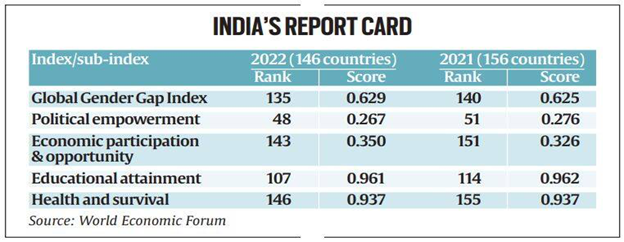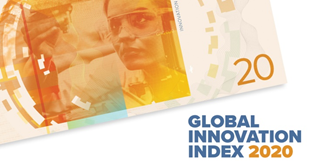Context
Recently, the Global Gender Gap Index for 2022 was released and it ranks India at 135 out of 146 countries.
- In 2021, India was ranked 140 out of 156 countries.
What is the Global Gender Gap Index?
- The report is annually published by the World Economic Forum (WEF).
Calculation
- On each of the four sub-indices as well as on the overall index the GGG index provides scores between 0 and 1, where 1 shows full gender parity and 0 is complete imparity.
- It measures scores on a 0-to-100 scale, which can be interpreted as the distance covered towards parity or the percentage of the gender gap that has been closed.
|
- It benchmarks gender parity across four key dimensions or sub-indices —
- economic participation and opportunity
- educational attainment
- health and survival
- political empowerment
- The report aims to serve “as a compass to track progress on relative gaps between women and men on health, education, economy and politics”.
- According to the WEF it is the longest-standing index, which tracks progress towards closing these gaps over time since its inception in 2006.
How has India fared on different sub-indices?
- India has approximately 662 million (or 66.2 crore) women.
- India’s (135th) global gender gap score has oscillated between 0.593 and 0.683 since the index was first compiled.
- In 2022, India scored 0.629, which is its seventh-highest score in the last 16 years.
- In 2022, India’s overall score has improved from 0.625 (in 2021) to 0.629.

Different sub-indices
- Political Empowerment
- Of all the sub-indices, this is where India ranks the highest (48th out of 146).
- This includes metrics such as the percentage of women in Parliament, the percentage of women in ministerial positions etc.
- However, notwithstanding its rank, its score is quite low at 0.267. Some of the best ranking countries in this category score much better. For instance, Iceland is ranked 1 with a score of 0.874 and Bangladesh is ranked 9 with a score of 0.546.
- Moreover, India’s score on this metric has worsened since last year – from 0.276 to 0.267. The silver lining is that despite reduction, India’s score is above the global average in this category.
- Economic Participation and Opportunity
- Here, too, India ranks a lowly 143 out of the 146 countries in contention even though its score has improved over 2021 from 0.326 to 0.350.
- Last year, India was pegged at 151 out of the 156 countries ranked. India’s score is much lower than the global average, and only Iran, Pakistan and Afghanistan are behind India on this metric.
- This includes metrics such as the percentage of women who are part of the labour force, wage equality for similar work, earned income etc.
- Educational Attainment
- Here India ranks 107th out of 146, and its score has marginally worsened since last year. In 2021, India was ranked 114 out of 156.
- This sub-index includes metrics such as literacy rate and the enrolment rates in primary, secondary and tertiary education.
- Health and Survival
- This includes two metrics: the sex ratio at birth (in %) and healthy life expectancy (in years).
- In this metric, India is ranked the last (146) among all the countries. Its score hasn’t changed from 2021 when it was ranked 155th out of 156 countries.

Where does India stand amongst its neighbours?
- India ranks poorly among its neighbours and is behind Bangladesh (71), Nepal (96), Sri Lanka (110), Maldives (117) and Bhutan (126).
- Only the performance of Iran (143), Pakistan (145) and Afghanistan (146) was worse than India in South Asia.
- In 2021, India ranked 140 out of 156 nations.

